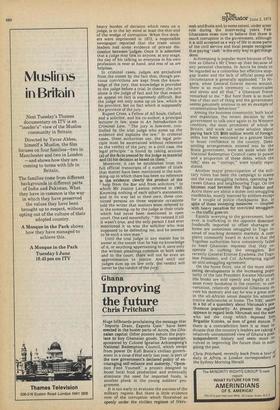Ghana
Improving the future
Chris Pritchard
Huge billboards proclaiming the message that 'Imports Drain, Exports Gain' have been erected in the busier parts of Accra, the Ghanaian capital. Other posters exhort the populace to buy Ghanaian goods. The campaign, sponsored by Colonel Ignatius Achiempong's National Redemption Council, which swept from power Dr Kofi Busia's civilian government in a coup d'etat early last year, is part of the new government's declared policy of encouraging self-reliance and austerity. 'Operation Feed Yourself.' a project designed to boost local food production and eventually eliminate the need for imported foods, is another plank in the young soldiers' programme.
It is too early to evaluate the success of the military regime. But there is little evidence now of the corruption which flourished so openly under the civilian regimes of Nkru mah and Busia and, to some extent, under army rule during the intervening years. Few Ghanaians seem now to believe that there is much corruption in the government, although it is still accepted as a way of life in some parts of the civil service and local people recognise that paying' cash 'is the only way to get things done.
Achiempong is popular more because of his role as Ghana's Mr Clean-up than because of any personal charisma. In Accra he tends to be regarded as a colourless but effective stopgap leader and the lack of official pomp and circumstance is generally applauded. "In Nigeria, when General Gowon moves around, there is so much ceremony — motorcades and sirens and all that," a Ghanaian friend remarked to me. "But here there is so much less of that sort of thing and the government .seems genuinely anxious to set an example of unostentatious behaviour."
Among the business community, both local and expatriate, the recent decision by the government to talk once again to its Western creditors, the most prominent of which is Britain, and work out some solution about paying back US WO million worth of foreign debts has been welcomed as a gesture likely to boost confidence in the country. Debt settling arrangements, entered into by the Busia government, were set aside when the
National Redemption Council came to power and a proportion of these debts, which the tcsitiRatCedsees as "corrupt," were totally repu Another major preoccupation of the military rulers has been the campaign to stamp out the vast smuggling rackets, operating between Ghana and neighbouring Togo. On the bitumen road between the Togo border and Accra there are about a dozen anti-smuggling roadblocks, mostly manned by soldiers except for a couple of police checkpoints. But, in spite of these sweeping measures — coupled with heavy penalties for convicted smugglers — the traffic goes on.
Equally worrying to the government, however, is trafficking in the opposite direction: foodstuffs imported to offset shortages at home are sometimes smuggled to Togo instead of reaching domestic markets. A complaint commonly heard in Accra is that the Togolese authorities have consistently failed to heed Ghanaian requests that they cooperate in curbing the smugglers, But recently General Etienne Eyadema, the Togolese President, and Col. Achiempong signed an anti-smuggling agreement. On the home front, one of the more interesting developments is the increasing popularity of the late President Kwame Nkrumah. His books are sold openly and legally at almost every bookshop in the country; in conversation, relatively apolitical Ghanaians revere his memory and say he was a great man in the all-African sense despite his administrative deficiencies at home. The NRC seems in a bit of a quandary about Nkrumah's pos" thumous popularity. At present the regime appears to regard both Nkrumah and the man who led the coup which deposed hill); Brigadier Kotoka, as men of great stature. it there is a contradiction here it at least in' dicates that the country's leaders are taking relatively uncommitted view of Ghana's post' 'independence, history and seem more involved in improving the future than in euln' gising the past.
f Chris Pritchard, recently back from a tour o, duty in Africa, is London correspondent 01 the Sydney Morning Herald.


































 Previous page
Previous page